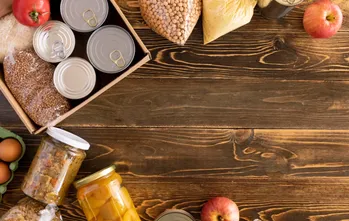Cutting Costs on Canned Foods: From Smart Shopping to Sustainable Storage
I. Introduction
As consumers become increasingly conscious of their budget, many are turning towards canned foods as an affordable and convenient option for meals. However, the cost of canned goods has risen significantly in recent years, making it essential to explore ways to save money while still enjoying these pantry staples. This article aims to provide ten practical strategies for cutting costs on canned foods, covering everything from smart shopping to sustainable storage.
II. Comparing prices
How to shop smartly for canned goods:
A. Identify cheaper brands or store-brand options
Canned goods come in a variety of brands and price points. To save money, it's worth checking out store-brand options as they often provide comparable quality at a lower cost than name-brand alternatives. Additionally, consider shopping around to compare prices across different stores - some may offer better deals on certain products.
B. Look for sales and discounts
Keeping an eye out for sales and promotions can significantly reduce the price of your favorite canned foods. Grocery stores often run seasonal specials, so be sure to check the ads or sign up for their newsletters to stay informed about upcoming offers. Additionally, consider buying items in bulk during clearance sales or end-of-season promotions when prices are lower than usual.
C. Buy in bulk or during clearance sales
Buying canned goods in bulk can lead to significant savings, especially for items with a long shelf life like beans and tomatoes. Look out for bulk bins or multi-packs at your local supermarket and stock up on items you know you'll use regularly. Clearance sales are also an excellent opportunity to snag deals on overstocked items that may have expiration dates far into the future.
III. Storage and preservation methods: Making your purchases last longer
A. Understand the expiration date labels on cans and how to read them
Canned foods come with a variety of expiration date labels, and it's essential to understand what they mean. "Best By," "Use By," and "Sell By" are all different labels that indicate when the product is at its peak quality or freshness. However, these dates don't necessarily indicate safety - canned goods are generally safe for consumption long after their expiration date, as long as the can has not been damaged or leaking.
B. Learn how to store canned goods properly to extend their shelf life
To keep your pantry organized and save money, it's essential to store canned goods properly. Place them in a cool, dry place away from heat sources, and avoid stacking cans too high as this can damage the labels or seals. Additionally, consider organizing your pantry by category or expiration date to make it easier to use up older items before they expire.
C. Explore alternative methods for preserving food, such as canning at home or vacuum sealing
For those who enjoy cooking and want to save money on canned goods in the long run, consider learning how to can foods yourself. While initially more expensive than buying pre-canned items, homemade canning allows you to control the ingredients and avoid preservatives and additives. Additionally, vacuum sealing is another alternative for preserving food that can be a cost-effective way of reducing waste and extending the shelf life of perishable goods.
IV. Alternative cooking methods: Reducing waste and enhancing flavor
A. Utilize a pressure cooker or slow cooker to reduce prep time and preserve nutrients
Cooking canned foods in a pressure cooker or slow cooker can significantly reduce prep time, as these appliances allow for faster cooking times while preserving nutrients. Additionally, they're an excellent way of preparing larger batches of food for meal prepping or freezing.
B. Add fresh herbs and spices for added flavor and nutrition
Adding fresh herbs and spices to your canned foods not only adds flavor but also nutrition. Consider using fresh garlic, ginger, and turmeric when cooking canned goods like soups and stews, as these ingredients are packed with vitamins and minerals that may be lacking in pre-packaged items.
C. Pair canned foods with fresh produce or grains for a healthy and balanced meal
To make your canned foods more nutritious, consider pairing them with fresh produce and whole grains for a well-rounded meal. For example, add spinach or kale to your canned soup for extra greens, or serve your canned beans over brown rice instead of pasta.
In conclusion, maximizing the value of canned goods requires understanding expiration dates, storing items properly, and finding ways to preserve food beyond traditional methods. By following these tips, you can save money on groceries while enjoying delicious and nutritious meals at home.
FAQ Section
Q: How can I find sales and discounts on canned goods?
A: Keep an eye out for sales and promotions in your local grocery store's ads or sign up for their newsletters to stay informed about upcoming offers. Also, look out for clearance sales or end-of-season promotions when prices are lower than usual.
Q: How should I store canned goods properly?
A: Place canned foods in a cool, dry place away from heat sources and avoid stacking them too high to prevent damage to the labels or seals. Consider organizing your pantry by category or expiration date to make it easier to use up older items before they expire.
Q: How can I preserve food besides buying pre-canned items?
A: For those who enjoy cooking, consider learning how to can foods yourself. While initially more expensive than buying pre-canned items, homemade canning allows you to control the ingredients and avoid preservatives and additives. Additionally, vacuum sealing is another alternative for preserving food that can be a cost-effective way of reducing waste and extending the shelf life of perishable goods.
Q: How can I make my canned foods more nutritious?
A: Add fresh herbs and spices like garlic, ginger, and turmeric to your canned soups and stews for added flavor and nutrition. Pair canned foods with fresh produce and whole grains for a well-rounded meal. For example, add spinach or kale to your canned soup for extra greens, or serve your canned beans over brown rice instead of pasta.
Q: How long do canned goods last?
A: Canned foods can generally last up to several years if unopened and stored in a cool, dry place. Once opened, they should be consumed within a few days or frozen for longer storage. Be sure to check the expiration date on each can before purchasing and consuming.
Q: How do I know if a can is still safe to eat?
A: If you're unsure about the safety of a can, check for any dents, bulges, or leaks in the lid or sidewall of the can. Also, smell and taste the contents inside; if it smells or tastes off, it may be spoiled or unsafe to eat. Remember, when in doubt, err on the side of caution and discard the can.











